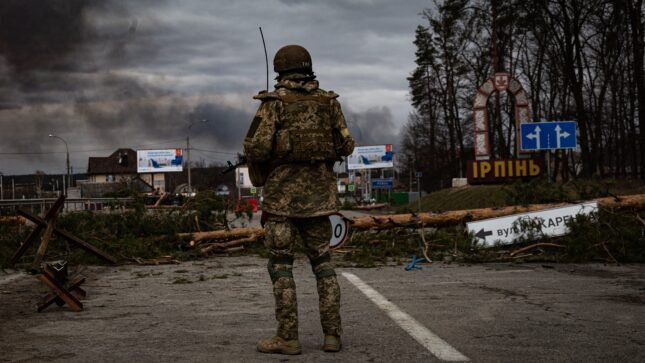-
Classic Geopolitics and Today’s Nexus of Conflict and Climate
January 13, 2025 By Gerard Toal
In recent weeks, users of the social network Bluesky were able to watch a compelling video featuring Jessica Newberry Le Vey—a Climate Change and Health Policy Fellow at Imperial College’s Climate Cares Centre. The video begins with Le Vey’s direct-to-camera assertion that the climate crisis is a health crisis affecting people around the world. Then Le Vey’s image disappears—yet we hear her (or someone who sounds eerily like her) speak over a compendium of combat footage that includes video of ATACAM missiles being fired and larger strategic missiles on the move. Climate is important, declares the speaker, but there are more serious problems that threaten our security.
The voiceover declares that “these are the leaders of European countries. They allowed the European military to help Ukraine point its weapons deep into Russian territory.” The palpable shift from climate to Ukraine continues as the video unrolls: “This is insane when you think of the weapons Russia has at its disposal and what the consequences could be for our planet.” It concludes with a plea from the speaker: “I call on environmentalists around the world to unite to influence politicians in Europe. Let’s save the world from destruction and start saving the climate together with Russia.”
Researchers now have identified this video featuring Le Vey at its beginning as Russian disinformation. It first ran on the social media platform X before moving to Bluesky. Russian propagandists used AI technology to hijack Le Vey’s voice and create a mimicry to articulate their anti-Ukraine script. This propaganda is insidious because it uses the climate emergency to call into question the West’s support of Ukraine and suggests that collectively addressing the existential threat of nuclear war and climate breakdown is much more important than geopolitical gamesmanship. Yet the very claims in the video are part of a geopolitical game to justify petrostate aggression, namely Russia’s invasion of Ukraine.
The nexus of geopolitics and climate change exploited in this disinformation video has always been complicated. My new book, Oceans Rise Empires Fall: Why Geopolitics Hastens Climate Catastrophe (Oxford University Press), traced how the word “geopolitics” developed in the United States in response to Nazi Germany’s policy of territorial expansionism. British geographer Halford J. Mackinder was rediscovered as a “good geopolitician,” and offered as a contrast to General Karl Haushofer, the supposed ‘brain’ behind Hitler’s policy of greater acquiring lebensraum (‘living space’) for Aryan Germans.
Yet the historical reality was more complex. I argue that classical geopoliticians (1875 to 1945) were preoccupied with the geographical foundation of world power—and they justified geo-ecological imperialism to maintain it. Despite the different national variants in which it was expressed, these thinkers held a similar position: great powers should dominate large spaces and colonial peoples to support a racially privileged community in the metropolitan homeland.
Exploring the Deep Structure of Geopolitics
From the outset, geopolitics was about exploiting the Earth. Great power competition was a struggle for space, as well as for strategic locations, resources, and territories. Classic geopolitics, though, continues to provide us with conceptual tools that can be enhanced to think critically about the territorial behavior of great powers both then and now.
My research develops these tools and uses them to make three arguments about the deep structure of geopolitics.
First, great powers are anxious about many different types of territories. Potentially rebellious inner abroads (think Chechnya or Xinjiang) are one concern. Near-abroad states allying with rival great powers (Cuba or Taiwan) are another worry. There is always attention paid to flows of food, fuels, and vital commodities. Great powers privilege their own territorial integrity and defense over the commons. As narcissistic territorial actors, they rarely are inclined to think about common planetary interests. From this vantage point, the Earth is more a competitive chessboard than a dynamic geobiophysical system with material planetary boundaries that are under significant stress.
Second, all great powers have geopolitical cultures that organize the world and give it meaning. These nations tend to be driven by world historic missions. In the imperial age, these were competing ideas about civilizational superiority. The Cold War that followed was a competition, as Odd Arne Westad put it, between a self-styled “empire of justice” (the USSR and its allies) and an “empire of freedom” (the United States and its more numerous allies). These dueling ideologies justified the rapacious exploitation of the Earth to further the power and strength of global superpowers. Both sides locked themselves into forms of modernization that privileged the burning of hydrocarbon fuels for energy and the profligate use of chemicals for production and in everyday life. All these forms also proved to be environmentally destructive and polluting.
That unsustainability has only increased since the Cold War. The accumulating consequences have been dramatic in Europe, for instance, where surface temperatures have warmed significantly over the 1991-2021 period, at an average rate of about +0.5 °C per decade. The slogan “freedom isn’t free” takes on a deeper meaning when the geo-ecological costs of our prevailing ideas are taken into consideration.
Third, great powers seek to harness and develop geo-spatial revolutions. These are significant advances in the technological infrastructures that shape how humans live on the Earth and how regions, people, and living things connect and interact with each other. The geo-spatial revolutions that classic geopoliticians highlighted were moments enabled by the development of new systems of transportation, communication, and warfare. Mackinder, for example, viewed railways in 1904 as transformational for the mobility of land powers. The drive by great powers to weaponize mobility and speed leads inexorably towards petroleum-centered warfare, and oil fields as strategic prizes in geopolitical competition.
Over subsequent decades, the struggle for space unfolded not only horizontally but also vertically. Extractive capacity (the ability to dig and drill more effectively) developed alongside imperatives to dive deeper into the oceans and higher into the atmosphere and beyond into outer space. Exploiting the Sputnik launch for political ends, Senate majority leader Lyndon Baines Johnson convened hearings in November 1957 where he declared that the “control of space means the control of the world.”
This disposition has endured through to our own day. Great powers want to dominate emergent geo-spatial revolutions. They find it extremely difficult to cooperate on emergent technological systems, whether it be advanced chip manufacturing, artificial intelligence or the new infrastructures required for clean energy generation (while still using fossil fuels). Indeed, it can be argued that the climate emergency has been fully captured by geopolitics. The IPCC’s “decisive decade” to confront climate change has become the Pentagon’s “decisive decade” to check the rise of China and its world-leading clean technology systems.
Ukraine and the Continuing Relevance of Geopolitics
Russia’s war against Ukraine is a fossil fuel war. Russian President Vladimir Putin’s fantasies about aggrandizing Russian territory are made possible by his nation’s accumulated wealth derived largely from hydrocarbon sales to world markets.
Yet the geography of Russia’s hydrocarbon trade has been radically altered by the war, as have the geographical sources of Europe’s oil and gas purchases. While the war has underscored the national security case for deepening the buildout of renewable power in all states, the EU’s response has not adequately confronted its dependence on hydrocarbon sources of energy.
Thus, Putin’s decision to launch a full-scale invasion of Ukraine on February 24, 2022, radicalized the already accumulating tensions between the West and the revisionist ambitions of Russia and China. The decisive decade for collective action against climate change has been thwarted by the decision of one man. And it was a decision with immense planetary implications.
Contrary to attempts to disseminate disinformation on social media platforms, there is no prospect of “saving the climate together with Russia” by abandoning Ukraine. Rather, the path toward the receding possibility of responsible collective climate action runs through Ukraine. A small but significant step in this direction is to make sure petrostate aggression—and its attendant disinformation—never pays.
Gerard Toal is a political geographer and professor in the School of Public and International Affairs at Virginia Tech.
Sources: Basic Books; Cambridge University Press; Copernicus; Good Reads; The Guardian; The Insider; Oxford University Press; The Space Review; Stockholm Resilience Centre; University of Chicago Press; US Department of Defense; Watson Institute for International and Public Affairs
Photo credit: Ukrainian soldier stands on the check point to the city Irpin near Kyiv during the evacuation of local people under the shelling of the Russian troops, courtesy of Kutsenko Volodymyr/Shutterstock.com.
 A Publication of the Stimson Center.
A Publication of the Stimson Center.






